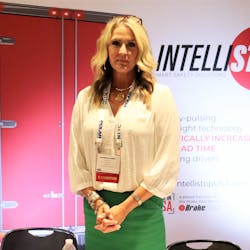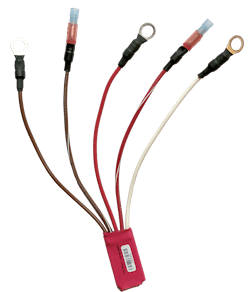The Federal Motor Carrier Safety Administration denied Intellistop’s exemption request Friday in a long-delayed decision, ruling the company has not shown an industry-wide exemption for its pulsating brake lamp module “would likely achieve a level of safety equivalent to or greater than the level of safety provided by the regulation.”
Intellistop sought to allow carriers to operate commercial motor vehicles equipped with its module, which pulses the rear clearance, identification, and brake lamps four times in 2 seconds when the brakes are applied—and then returns the lights to a steady-burning state—in its application filed in December 2020 and published in the Federal Register in June 2021. After waiting more than 560 days—three times longer than the mandated 180-day window—Michelle Hanby, Intellistop’s president, filed a petition Sept. 7 with the U.S. Court of Appeals for the District of Columbia asking the court to “direct FMCSA to fulfill its statutory duty and promptly decide” on its request.
Friday’s ruling was not the decision she hoped to receive.
“I’ve had plenty of conversations with my attorneys, so I was prepared; and I’d like to say it didn’t surprise me—since it’d already been nearly 600 days and they still hadn’t approved it—but it did,” Hanby told Bulk Transporter. “I’m the eternal optimist, and I was especially optimistic after [the American Trucking Associations’ Technology and Maintenance Council annual meeting], where we had a lot of great conversations about this issue.
“So it still is very disappointing.”
See also: Intellistop's pulsating rear lamp module caught in bureaucratic limbo
The denial, signed by FMCSA Administrator Robin Hutcheson, comes only two weeks after Hutcheson was confirmed by the Senate as the agency’s first full leader in three years, timing Hanby questioned. “There was nothing eye-opening or so compelling in the denial that it would take this long to decide,” Hanby argued.
“It was absolutely a political play.”
Hanby quickly filed an updated petition Friday arguing FMCSA’s ruling is “arbitrary and capricious.”
“We will have an answer to their comments, I believe they will answer back—and then we’ll go to court, eventually,” she said.
Support and opposition
In its denial, FMCSA reiterated it received public comments from 20 stakeholders, and 16 organizations and individuals supported approving the exemption application, including the American Trucking Associations, which pointed out that “consistent with [the U.S. Department of Transportation’s] reports and research, National Tank Truck Carriers (NTTC) and Grote Industries have successfully petitioned the agency to recognize the value of enhanced rear signaling (ERS) for improving safe operations when compared with traditional standard brake lamps.”
The Transportation Safety Equipment Institute (TSEI) opposed an exemption that allows for “pulsating required lamps without a thorough consideration of safety data and research,” and without “consistent standards” for lamps on the rear of commercial vehicles that address the “number, color, intensity, flash patterns, duty cycle, location, and other characteristics” of the lamps. The Commercial Vehicle Safety Alliance opposed “allowing red brake-activated pulsating lamps because pulsating red lamps are typically associated with emergency vehicles.”
Hanby took exception with TSEI’s position, which is cited multiple times in FMCSA’s ruling.
“They claim to be a safety equipment institute,” she said. “Yet they never talked to me, and they’ve never seen my product, so they know nothing about it. So how can they give an opinion when they don’t have all the information?”
The agency also acknowledged that rear-end crashes remain a serious issue, accounting for approximately 30% of all crashes; large trucks are “consistently three times more likely than other vehicles to be struck in the rear in two-vehicle fatal crashes,” according to data on crashes that occurred between 2010 and 2016; and other existing data, including NHTSA’s research published in 2002 and 2009, “supports the potential safety value of alternative rear-signaling systems.”
Denial justification
FMCSA cited several reasons for its decision, including further “data deficiencies,” the potentially broader scope of Intellistop’s request, and its reluctance to support a “blanket” exemption that alters “the performance of a required lamp covered by the [Federal Motor Carrier Safety Regulations] and FMVSS.”
However, FMCSA admitted the number of vehicles already operating under similar exemptions “is significant,” and as Bulk Transporter previously reported, some states, like Tennessee, already allow all classes of vehicles to use “continuously flashing light systems”—defined there as “brake light systems in which the brake lamp pulses rapidly for no more than 5 seconds when the brake is applied”—and presumably haven’t reported any issues to NHTSA or FMCSA, since they aren’t mentioned in the denial.
FMCSA also asserts Intellistop’s exemption application is “far broader in scope than most previous exemption applications FMCSA has granted, as it would apply to any motor carrier that sought to use Intellistop’s equipment” and the agency wouldn’t be able to “sufficiently monitor operations under the exemption.” But it isn’t set up to process thousands of individual exemption requests either, and according to FMCSA data, there were more than 2 million active motor carriers as of Aug. 26. That’s why FMCSA already granted numerous exemptions to manufacturers on behalf of all motor carriers, including Grote’s rear lamp exemption, Stoneridge’s mirror exemption, and Ford’s exhaust system exemption.
The agency also recently amended the FMCSRs to increase the area on the interior of a commercial motor vehicle’s windshield where safety technology devices may be mounted in a rulemaking that lists 11 exemptions previously granted to manufacturers, including Bendix, Netradyne, Samsara, Lytx, and SmartDrive.
“You have to laugh,” Hanby said. “They’re grasping for straws.
“Grote’s exemption is a blanket, and NTTC’s is a blanket for one industry. Unfortunately, while I think their case is weak, it will take a long time to go before a judge.”
Motor carrier exemptions
FMCSA noted its decision doesn’t “preclude motor carriers from seeking exemptions from 49 CFR 393.25(e) to purchase, install, and use the Intellistop device subject to the terms and conditions of an exemption if granted by FMCSA.”
Hanby said at least 10 carriers already submitted exemption applications for Intellistop’s pulsating brake-lamp module in the last month, and she expects FMCSA to begin publishing those applications for public comment soon. She’s also hoping more carriers will follow suit while her case plays out, so she plans to put a document on Intellistop’s website carriers can download, complete, and email to FMCSA.
“It costs nothing, so every fleet should do it,” she said. “It doesn’t mean they have to use the product.
“I would love to get 10,000 fleets to file an exemption because it would show how asinine the process is. It would bog them down so much they’d probably have to hire additional help to process all of those applications—instead of only one.”
Safety first?
U.S. Secretary of Transportation Pete Buttigieg has insisted in recent speeches that the federal government will pave the way for innovation in transportation by helping companies, and particularly woman-owned businesses, bring safety technology to the market. “We should plan proactively to support the growth of new ideas and make sure that Americans share the benefits,” he said during CES 2022 in January.
Yet, given the opportunity to do exactly that, FMCSA went in a different direction.
“It absolutely is opposite of what he says,” Hanby said.
“Everything he’s said the past 10 months has been about safety, the private sector, being less risk adverse, and trying something that has potential. So it’s like these agencies aren’t connected. I think it’s poor communication. I’m not sure how engaged he is. I wonder if he even knows about Intellistop’s device. But [DOT Deputy Secretary] Polly Trottenberg knows about it, Robin certainly knows, and all of NHTSA and FMCSA know—and it’s as if they are doing whatever they want, without regard to Buttigieg’s speeches.”
About the Author
Jason McDaniel
Jason McDaniel, based in the Houston TX area, has more than 20 years of experience as an award-winning journalist. He spent 15 writing and editing for daily newspapers, including the Houston Chronicle, and began covering the commercial vehicle industry in 2018. He was named editor of Bulk Transporter and Refrigerated Transporter magazines in July 2020.



